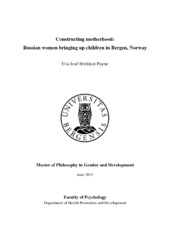| dc.description.abstract | The main objective of this study was to explore how Russian women have constructed motherhood within the Norwegian context. The empirical material came from qualitative, loosely structured interviews with nine middle-class, educated, Russian immigrant women in Bergen, Norway. In this study motherhood was understood as both constructed and contextual, and as part of a broader conceptual framework made up of the following: Baumrind's typology of parenting styles; a culture, gender and social class perspective on parenthood; and the interrelation between acculturation and cultural identity in the context of immigrant parenting. Motherhood was also seen as a changing and changeable practice, both within a particular socio-cultural setting and in the context of the lives of these mothers, allowing for the possibility to explore the influence of transnational ties and historical change on the construction of cultural identity and immigrant motherhood. The interplay between structure and agency was explored in relation to the way in which study participants had adapted to, and reconciled, what they recognised as the possibilities and limitations of childrearing in Norwegian society. Regarding the position of informants as Russian immigrant mothers, examples were given that show the capacity of the research participants to navigate within the Norwegian social and cultural setting, and their recognition of the advantages and disadvantages of motherhood in this context. The agentive capacity of these women has been brought to the fore as an overarching theme across the three main aspects of this research: motherhood in the Norwegian context, gendered parenthood, and cultural identity and culture transmission. This study has explored the way in which the research participants conceived of their mothering role in relation to their knowledge of gender relations and cultural conceptions of motherhood in their host country, Norway, and their native country, Russia. The most significant findings that came across through the interview process was that these mothers were as much concerned with discussing and defining what Russianness' meant in their own lives and the lives of their children, as with highlighting the influence of Norwegian cultural values on their mothering practice. This impacted on both their discussion of gendered parenting roles and the transmission of Russian culture to their children. Part of their agentive capacity was manifested in the way in which they each chose to position themselves differently and selectively in relation to Norwegian and Russian cultural practices and to specific aspects of motherhood. Each mother was going through her own individual process of acculturation which involved exercising agency as part of the construction of immigrant motherhood. This study is adding to previous research by giving weight to intragroup differences and presenting individual research participants in both an in- depth and holistic way. | en_US |
